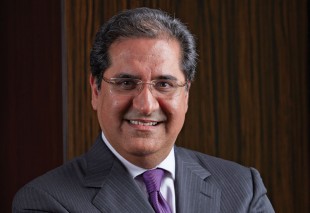

VP Interview: Shaza Hotels' Sanjiv Malhotra

Sitting in the comfort of an exclusive business lounge, Sanjiv Malhotra, executive vice president of Shaza Hotels is at home. Urbane and self-assured, he exudes everything that the hotel chain stands for: confident yet modest, refined and cultured with a business edginess that never drops.
He describes the objective of the hotel chain: “Shaza Hotels is a luxury brand in the making; a joint venture with Kempinski Hotels,” he explains. The collaboration brings together the 100-plus years’ experience and recognisable Kempinski brand and the distinctive offering of the niche Shaza brand.
So what makes Shaza hotels different from the plethora of hotels that are springing up like mushrooms throughout the Gulf?
“While it’s an affiliate of Kempinski, it is also an independent luxury brand that aims to create a presence within the geographical footprint of the Middle East and the North Africa region,” Malhotra elaborates.
“The major difference being that this is a brand of luxury hotels that seeks to embrace the cultures of the Arabian lifestyle.” Malhotra emphasises that the chain will “only extend into those destinations where there is a market that is seeking to fulfil the Arabian traveller.”
He explains that while it may seem that Shaza appeared suddenly on the hospitality horizon, it was in fact years in the making. “The brand’s formation started about four to five years ago, the brainchild of Dr Mohammad Hammour, a former MIT professor, who runs a real estate finance firm called Capital Guidance, based in Europe, the US and Malaysia.”
‘Vision Custodian’, Dr Hammour, the story goes, saw an opportunity for a brand that captured the Arabian culture, without in-your-face, ‘1001 Arabian Nights’ theming – something more contemporary and subtle.
“The market already has a deluge of hotels that are either too westernised or too stereotypical,” says Malhotra, adding that architectural representation of a culture or civilization doesn’t have to be overdone to get the design elements over.
“We drew inspiration from Mandarin Oriental by way of design treatment, as it does a marvellous job of representing the Chinese civilization, regardless of location,” he says.
Hammour’s vision was to recreate the same subtlety and respect for the Middle Eastern traditions, within a luxury hotel chain, and Shaza was born.
Shaza hotels will support the halal lifestyle, from underplayed, tastefully placed mashrabiya interior design elements, to cuisine, food preparation, training and authentic “rituals and services”, Malhotra explains.
While every hotel brand wants to be distinctive and be seen as different, the Arabic culture is one of hospitality, where Bedouins would welcome a weary traveller into their desert tents and offer them sustenance and a place to rest their weary head. This, on a grander, more luxurious scale, is the ethos of the Shaza Hotel chain – “a true representation of the Arabian culture,” he adds proudly.
Malhotra explains the importance of specific differentiators that dictate how a person perceives a brand. He elaborates: “How do you feel as you enter the hotel, in terms of space, architecture and design; what is the sense you feel? Ideally, the establishment should take on the flavour of its location, but retain its [brand] identity.”
Service is also key to the experience, and Shaza has its own bank of specialised, exclusive service offerings, he intimates, with an enigmatic smile.
“The third differentiator of a brand is its people, who vary from country to continent. Our interaction is very specific to Arabian custom – that of hospitality and welcoming – inculcated with simple rituals and traditions; and the generosity of the service itself.”
While one might think that an overdose of luxury would deter families, Malhotra is adamant that this is not the case as family is the very core of Arabic culture. “Many of our service products are designed around the family unit as, in
the GCC, the family is one of the largest market segments.”
Intra-travel within the GCC, he explains, has the highest rate of growth than any continent, presently. He puts it down to the sense of belonging and community within the Gulf region, a sense of comradery.
“Nevertheless, GCC travellers have tasted Europe and the Far East, and have a profound appreciation of all that these far lands represent, but they are equally confident of their own region’s offerings,” he states – and Shaza is intent on making this region its focus.
He believes that it’s the sense of pride within Middle Eastern citizens in their own cultures that will drive the success of the Shaza brand in the region.
“There is a cultural pride that has surged over the last 10 years and with it a desire to represent this culture in its purest forms, from jewellery, the equestrian arena and calligraphy – and in hotels,” Malhotra observes philosophically.
And it seems that Shaza is aiming to become a perfect manifestation of that that desire.
To date, Shaza is undertaking projects in Fez, Morocco; in Mecca, Riyadh and Jeddah, Saudi Arabia; in Amman, Jordan; in Doha, Qatar and Muscat and Salalah in Oman. The group has also included Bahrain in its pipeline plan.
Malhotra concludes that Shaza Hotels is keen to discuss future developments with investors and will welcome all approaches.
If all goes to plan. the sudden emergence of the Shaza chain will surprise and delight its stakeholders in equal measure.